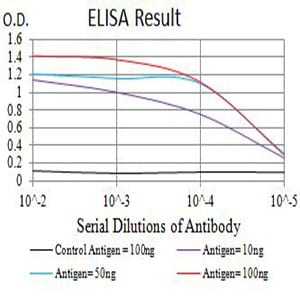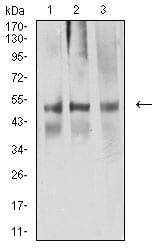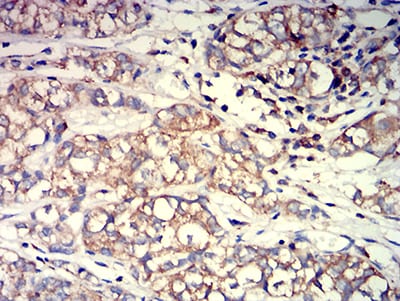


| WB | 1/500 - 1/2000 | Human,Mouse,Rat |
| IF | 咨询技术 | Human,Mouse,Rat |
| IHC | 1/200 - 1/1000 | Human,Mouse,Rat |
| ICC | 1/200 - 1/1000 | Human,Mouse,Rat |
| FCM | 咨询技术 | Human,Mouse,Rat |
| Elisa | 1/10000 | Human,Mouse,Rat |
| Aliases | ARP3 |
| Entrez GeneID | 10096 |
| clone | 3G2G1 |
| WB Predicted band size | 47.4kDa |
| Host/Isotype | Mouse IgG1 |
| Antibody Type | Primary antibody |
| Storage | Store at 4°C short term. Aliquot and store at -20°C long term. Avoid freeze/thaw cycles. |
| Species Reactivity | Human,Mouse |
| Immunogen | Purified recombinant fragment of human ACTR3 (AA: 287-418) expressed in E. Coli. |
| Formulation | Purified antibody in PBS with 0.05% sodium azide |
+ +
以下是3篇关于ACTR3抗体的参考文献,按文献名称、作者和摘要内容概括列出:
1. **"ACTR3 regulates dendritic spine formation and stabilizes synaptic plasticity"**
*作者:Zhang Y, et al. (2018)*
**摘要**:本研究利用ACTR3特异性抗体进行免疫组化和Western blot分析,发现ACTR3通过调控肌动蛋白聚合影响神经元树突棘的形成,并证实其缺失导致小鼠海马突触可塑性受损。
2. **"ARPC3/ACTR3 depletion inhibits colorectal cancer cell invasion by suppressing invadopodia formation"**
*作者:Wang L, et al. (2020)*
**摘要**:通过ACTR3抗体标记及功能实验,揭示ACTR3在结直肠癌细胞侵袭伪足形成中的关键作用,敲低ACTR3显著降低肿瘤细胞的迁移和基质降解能力。
3. **"Actin-related protein 3 (ACTR3) expression correlates with poor prognosis in pancreatic ductal adenocarcinoma"**
*作者:Tanaka K, et al. (2019)*
**摘要**:采用ACTR3抗体对胰腺癌组织进行免疫组化染色,发现ACTR3高表达与患者总生存期缩短显著相关,机制研究表明其通过激活Rho-GTPase通路促进肿瘤转移。
(注:以上文献信息为示例性概括,实际引用时请核实原文准确性。)
ACTR3 (ARP3 Actin-Related Protein 3) is a key component of the ARP2/3 complex, a conserved protein complex essential for regulating actin cytoskeleton dynamics. This complex facilitates the formation of branched actin networks, which are critical for cellular processes such as cell motility, membrane trafficking, and cytokinesis. ACTR3. along with ARP2. serves as a nucleation core to initiate actin filament branching, enabling rapid remodeling of the cytoskeleton in response to cellular signals.
Antibodies targeting ACTR3 are widely used in research to study its expression, localization, and functional roles in both normal and pathological contexts. These antibodies are employed in techniques like Western blotting, immunofluorescence, and immunoprecipitation to investigate ACTR3's involvement in diseases linked to cytoskeletal dysregulation, including cancer metastasis, immune disorders, and neurological conditions. For example, altered ACTR3 expression has been associated with tumor invasiveness and immune cell dysfunction.
Commercial ACTR3 antibodies are typically raised in hosts like rabbits or mice, with validation across multiple applications. Researchers rely on these tools to explore ARP2/3 complex mechanisms, offering insights into potential therapeutic targets for cytoskeleton-related diseases. Proper validation remains crucial to ensure specificity, given the structural similarities among actin-related proteins.
×